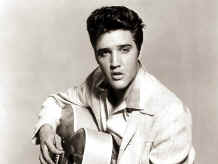

Elvis Presley was the first real rock and roll star. A white southerner who singing blues laced with country and country tinged with gospel, Presley brought together music from both sides of the color line. Presley performed this music with a natural hip swiveling sexuality that made him a teen idol and a role model for generations of cool rebels. Presley was repeatedly dismissed as vulgar, incompetent and a bad influence. However the force of his music and image signaled to the mainstream culture it was time for a change.
|
|
|
|
|
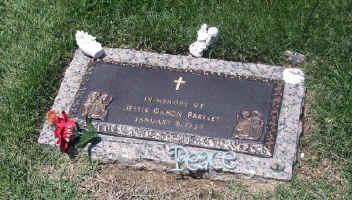
Born January 8, 1935, in East Tupelo, Mississippi, Presley was the son of Gladys and Vernon Presley, a sewing machine operator and a truck driver. Presley's twin brother Jesse Garon was stillborn, and he grew up as an only child. At age three, Vernon was sent to prison for forgery. It seems that Vernon, Travis Smith, and Luther Gable changed the amount of a check from Orville Bean,Vernon's boss, from $3 to $8 and cashed it at a local bank.Vernon pled guilty and was sentenced to three years at Parchment Farms Penitentiary. Vernon's boss, Mr. Bass called in a note that Vernon signed to borrow money to build the house and Gladys is forced to move in with Vernon's parents. Vernon would only serve eight months. Afterward Vernon's employment was spotty and the family lived just above the poverty line. The Presleys attended the First Assembly of God Church whose Pentecostal services always included singing.
|
|
Entering the fifth grade, Presley is asked by his teacher, Oleta Grimes to enter a talent contest on children's day at the Mississippi-Alabama Fair and Dairy Show. At the age of ten, dressed in a cowboy suit, and standing on a chair to reach the microphone. Presley's rendition of Red Foley's "Old Shep" won second place, a $5 prize and a free ticket to all the rides. On his birthday the following January he received a guitar purchased from Tupelo Hardware Store. Over the next year, Vernon's brother Johnny Smith and First Assembly of God pastor Frank Smith. gave him basic guitar lessons
Sixth Grade Report Cards |
|
|
In 1948 after losing another job Vernon moved the family to Memphis. Glady's brothers get him a job at the Precision Tool Company and the Presleys moved into a small apartment at 370 Washington Street for $11 a week. On September 13 Elvis enrolls at L.C. Humes High School.
|
|
Starting his sophomore year Presley works in the school library and after school at Loew's State Theatre. In 1951, his receives his first driver's license, joins the ROTC unit at Humes High, tries out for the football team (he's cut by the coach when he won"t trim his sideburns and ducktail), and in his spare time hangs around the black section of town, especially on Beale Street.
|
|
|
|
In his senior year Presley gets his first car, a 1941 Lincoln Zephyr, from Vernon. At eighteen majoring in Shop, History, and English he graduates from Humes High in 1953.
|
|
The day after graduation he took a job at Parker Machinists Shop. By June he was working at the Precision Tool Company and then drove truck for the Crown Electric Co. After a short time in the stock room he is promoted to truck driving and begins to wear his long hair in a pompadour, the current truck driver style. That summer he recorded "My Happiness" and "That's When the Your Heartaches Begin" at Memphis Recording Studios, a sideline Sam Phillips had started at his Sun Records studios where anyone could record a ten inch acetate for four dollars.
|
|

Presley returned on January 4, 1954 and recorded "Casual Love Affair" and "I'll Never Stand In Your Way" at which time he met Sam Phillips. Later the spring Phillips called him to record "Without You," a song Phillips had received as a demo. Despite numerous takes Presley failed miserably and at Phillips request just began singing songs in the studio. It was at this time Phillips began believing that he had found what he had been looking for "a white man with the Negro sound and the Negro feel".
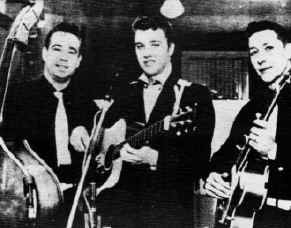
Elvis with the Blue Moon Boys - Bill Black and Scotty Moore
Scotty Moore was inducted into the Rock and
Roll Hall of Fame in 2000
Bill Black was inducted into the Rock and Roll
Hall of Fame in 2009
Phillips enlisted lead guitarist Scotty Moore and bassist Bill Black to work with Presley. Though July 4, 1954 is often sited as their first meeting, the three had actually been practicing for several months. On July 5, 1954, they recorded "I Love You Because," "Blue Moon of Kentucky," and "That's All Right".
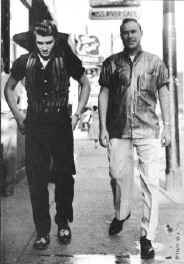
Presley with Dewey Phillips
Two days later Memphis disc jockey Dewey Phillips played "That's All Right" on his Red Hot and Blue show on radio station WHBQ. Audience response was overwhelming and later that night Presley came in for his first interview. Scotty Moore became his manager and "That's All Right" b/w "Blue Moon of Kentucky" became his first local hit. On September 25, Presley made his first and last appearance at the Grand Ole Opry.
|
|
|
In October Presley appeared on the Louisiana Hayride, a popular radio program that appeared regularly through 1955. In March 1955, he made his television debut on the local television broadcast of the Hayride. Meanwhile "Good Rockin' Tonight" b/w "I Don't Care if the Sun Don't Shine" were becoming hits in the Memphis area.
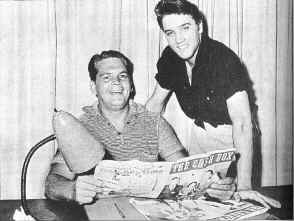
Bob Neal and Elvis
In early 1955, Moore quit managing Presley, but would continued playing in his band for several years. Bob Neal, a Memphis disc Jockey, became Presley's new manager. Colonel Thomas Parker would first entered Presley's career when he helped Neal make some tour arrangements. Still considered a country act, Presley continued to play locally, and in April went to New York to audition unsuccessfully for Arthur Godfrey's Talent Scouts program. On May 13, his performance in Jacksonville started a riot, "Baby Lets Play House" b/w "I'm Left, Your Right, She's Gone" was released and reached #10 on the national Country & Western chart in July.
|
|
"No singer is worth that much"
Mitch Miller on the suggestion of a bid of $20,000 from RCA for
Elvis Presley, August 15, 1955
On August 15, 1955, Parker persuaded Neal to sign over management rights to Presley for a yearly $2,500 and attendance bonuses.
Presley then signed a new contract with Parker that gave Parker twenty-five percent of his earnings for ten years, renewal in 1967 with Parker's commission doubling to fifty percent.
That September Presley had his first #1 country record "Mystery Train" b/w "I Forgot to Remember to Forget." By this time Colonel Parker, despite the agreement with Neal, had become increasingly involved with Presley's career and had negotiated for RCA to purchase Presley's contract from Sun Records for $35,000.
Contract Breakdown - Sam Phillps received $20,00 for Presley's contract and Sun Recordings. A $5,000 bonus would be split 75-25 between Presley and his new manager Tom Parker. An additional $15,000 was paid by by Hill and Range, for RCA, for 50% of anything Presley recorded that they held the publishing to. The result was that RCA on spent $10,000 of their own money. Presley got a bonus of about $3000 which he used to buy his mother Gladys a pink Cadillac.
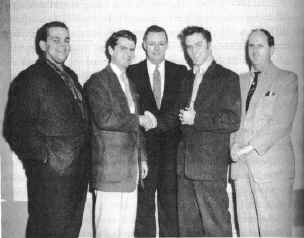
Contract Signing
L to R: Bob Neal, Sam Phillips, Elvis Presley, Tom Parker
After signing with RCA Presley became a national star in 1956. He went to Nashville to record his first records for RCA. Among them was "Heartbreak Hotel.." On January 28, 1956, he made his television debut on the Dorsey brothers' Stage Show, followed by six consecutive appearances. In March Parker became Presley's manager for which he was to receive 25% of his earnings. The contract lasted Presley's lifetime and beyond.
|
|
|
|
Presley appeared on the Milton Berle, Steve Allen, and Ed Sullivan television shows. That April Presley made his debut in Las Vegas at the New Frontier Hotel, but the two week engagement was cancelled after a week due to poor audience response. In August Presley began filming his first film Love Me Tender. Released three months later it recouped its filming cost of $1 million in three days. His singles that year included "Heartbreak Hotel," "I Was the One," "Blue Suede Shoes," "I Want You, I Need You, I Love You," "Hound Dog," "My Baby Left Me, "Anyway You Want Me," "Love Me Tender," "Don't Be Cruel," "Love Me," and "When My Blue Moon Turns To Gold" were all certified gold.

In early 1957 Presley became the target of criticism by teachers, clergymen, and even other entertainers who thought his style was to suggestive. Even being nicknamed "Elvis the Pelvis" by one writer. On January 6, he made the last of his three appearances on the Ed Sullivan Show and was shown only from the waist up.

In March 1957 Presley purchased Graceland, a former church and converted it into a twenty three room mansion. In February "All Shook Up" began an eighteen week stretch at number #1
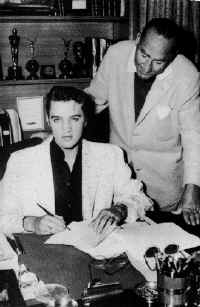
Signing movie contract as Hal Wallis
watches
Presley was the first rock star to crossover into films with consistent commercial success. Loving You, his second film, was released in July 1957 and "Teddy Bear" from it's soundtrack went to #1 on the pop, country, and R&B charts, as did "All Shook Up" and "Jailhouse Rock," the title song from his next movie.
Unnoticed by the motion picture deal was that Elvis's band was being pushed aside. Love Me Tender director Ken Darby refused to use them in the movie.as well as being excluded from the sound track. When the first went on the road the agreement was that Elvis would received 50% with Scotty and Bill splitting the other 50%. When drummer D.J. Fontana was added to the group he was given a $100-125 weekly salary. When Presley's manager, Col. Tom Parker got involved the financial structure changed.
D.J. Fontana was inducted into the Rock and Roll Hall of Fame in 2009
Moore and Black went on salary receiving $100 weekly when they weren't working and $150 when they were.
"We had to buy our own meals and
clothes, When it got to where he was really raking in the bucks,
and we were at the same level, well our union wasn't strong
enough so the only thing to do was to quit."
Scotty Moore
Moore and Black quit in 1957. Later Parker would use them to do a tour of the Northwest which they agreed to at $250 a show but when it ended they went their separate ways.
|
|
That December he received his draft notice, but was given a 30 day deferment to complete the filming of King Creole. Presley's first four feature films are considered his best. Originally Presley intended to be a serious actor, but unfortunately after he left the service, the choice of roles was left entirely to Colonel Parker with poor results. Since Presley would not tour until the early Seventies, it was through these movies that his fans most fans saw him and that alone accounted for their massive success.

On March 24, 1958 Presley entered the Army. The next months saw number one hits with "Don't" and "I Beg You." A few months later he went on leave to be with sick mother. Gladys Presley died the day after his arrival home in Memphis, on August 14, 1958. Presley would call her death the greatest tragedy in his life. He returned to the Army and was shipped to Bremerhaven, West Germany. In January 1960 he was promoted to sergeant and was discharged that March.

During his time in the service Colonel Parker continued to release singles recorded before his departure so his fans wouldn't forget him. a number of these were hits including "Wear My Ring Around Your Neck," "Don't Cha Think It's Time," "Hard Headed Woman," "Don't Ask Me Why," "One Night," "I Got Stung," "A Fool Such as I," "I Need You, I Love You," "A Big Hunk O' Love," and "My Wish Came True". In 1958 alone Presley earned over $2 million. After his release from the Army in March 1960, he recorded his first stereo record, "Stuck On You" and later that month he taped a TV program with Frank Sinatra, The Frank Sinatra Timex Special.

In July Vernon, Presley's father remarried. Vernon Presley's second wife was Davada "Dee" Stanley. At this time Presley began gathering more closely around him his friends, employees, and hangers on that would become known as the Memphis Mafia and would accompany him almost constantly until his death. Presley's world would become increasingly insular.
|
|
G.I. Blues was released in in 1960 and "It's Now Over Never" reached #1. Presley had five number #1 hits in the early 60s, "Stuck On You," "It's Now or Never, "Are You Lonesome Tonight," (1960), "Surrender (1961); and "Good Luck Charm" (1962). Priscilla Beaulieu, a teenage daughter of an Army officer that Presley had met while in Germany, visited Graceland during Christmas 1960. In early 1961 she moved in, it was said, under the supervision of Vernon and Davada. The press went along with the spin Colonel Parker put on the story, and few seemed to care the King of Rock and Roll was sharing his house with a teenaged girlfriend.
|
|
|
|
|
|
After a live performance on March 25, 1961 Presley quit performing and spent the next eight years making movies. The soundtracks from his movies were generally poor. By the mid-Sixties Presley was earning $1 million per movie plus a large percentage of the gross. Each movie had a concurrently released soundtrack album, five of which went gold. Presley was displease with these films, but Colonel Parker insisted that Presley stick with this winning formula. Years later Parker's shortsightedness would result in his turning down Barbara Streisand's offer to have Presley co-star with her the 1974 remake of A Star Is Born. Parker felt Streisand didn't deserve equal billing with Presley.
|
|
|
With the British invasion, teenagers were hearing more of his
disciples than Presley himself. Presley, unlike most American
rockers wasn't swept away, but the Top Ten was increasingly
beyond his reach. Presley turned increasing inward, focusing on
the family. On May 1, 1967 Presley married Priscilla in Las
Vegas; on February 1, 1968 their only child Lisa Marie was born.
Fearing he had been forgotten, Presley defied Parker and made a
comeback television special. Over the summer he taped the
television special that was released on December 3, 1968 to high
ratings. It's soundtrack reached #8 and produced his first Top
Twenty single "If I Can Dream" (#12, 1968) since
1965. With this success Presley turned to performing in Las
Vegas. On July 26, 1969 Presley began a month long
appearance at the International Hotel. This set the course for
all of his future performances. His fee for four months was over
a $1 million. Riding the crest of the comeback Presley released a
series of top singles, including "In the Ghetto,"
"Suspicious Minds," "Don't Cry Daddy," and
The Wonder of You". Presley began touring again, his shows
selling out and frequently breaking box office records. Two on
tour documentaries were released Elvis: That's the Way It Is
(1970) and Elvis On Tour (1972), the latter which won
the Golden Globe Award for Best Documentary.
Elvis Presley's career took a turn when he headed for the glitter
and lights of Las Vegas. In 1969, he started at the
International, which at the time was the largest hotel in the
world and would later become the legendary Hilton Hotel. He was
paid $100,000 a week for two shows a night, a month at a time,
twice a year, and his contract was for seven years. The hotel
casino gave Elvis $10,000 in free gambling chips every day - but
he never actually played, as he said it went against the teaching
of his Southern Baptist upbringing. Elvis being in Las Vegas
created a huge boom of business for Sin City, and tens of
thousands of people went there to see him. Most see Elvis' Vegas
years as his downfall, but for many years he drew some of his
largest crowds there.

Elvis Presley Boulvard
Presley was honored with countless Elvis Presley days around the country, and the U.S, Jaycees named him one of the ten most outstanding young men of America in 1970. His birthplace in Tupelo, Mississippi was opened to the public and a portion of Highway 61 South that ran in front of Graceland was renamed Elvis Presley Boulevard. That October Presley had his last Top ten hit "Burning Love" (#2).
Meanwhile Presley's personal life had become the subject of countless tabloids.In February 1972, Presley separated from Priscilla and on his birthday in 1973 filed for divorce. Less than a week later the TV special Elvis: Aloha from Hawaii was broadcast over satellite to over a billion people in forty countries, an indication of his international appeal although (with the exception of three dates in Canada in 1957 and an impromptu performance in Paris while on leave in 1959) Presley never performed outside the United States. During his career Presley had 94 gold singles, three gold EPs, and over 40 gold albums. His movies grossed over $180 million and millions more were made by the merchandising of Elvis products, the rights which were controlled by Colonel Parker

Outwardly, Presley was more popular than ever and one of the biggest personality cults in modern history was taking hold. Off stage Presley was plagued with self doubt, poor management, and a basic dissatisfaction with his life. He repeatedly threatened to quit show business, but debts and financial obligations to his large extended family, employees, and assorted hangers on made that impossible. Presley turned to drugs. After leaving the army he became wary of the public and would often rent whole movie theatres and amusement parks that he would visit at night. By the late Sixties he was an almost total recluse. Although there was evidence that Presley began taking drugs shortly after began performing or while in the army, his abuse of prescription drugs increased during the last years of his life. Through all this he remained highly spiritual and publicly denounced the use of recreational drugs.

Toward the end of his life he would babble incoherently on stage and rip his pants, having grown quite obese, and at least once collapsed on stage. Despite deteriorating health, Presley maintained a frantic tour schedule, because in 1973 Colonel Parker negotiated a deal with RCA to the rights of many of his masters in exchange for a lump sum payment of which only 2.8 million came to him. After 1973, Parker was earning nearly 50% commission. Worse yet Presley wasn't earning royalties on records recorded before 1973, although they continued to sell millions. Presley opposed tax shelters on principle; naively relied on his father for business advice; gave away expensive gifts and cash. The result was by the mid-Seventies was an impending financial disaster.

June 26, 1977 Presley performed live for the last time in Indianapolis. On August 16, 1977, the day before his next scheduled concert, Presley was discovered by his girlfriend Ginger Alden dead in his bathroom at Graceland. His death was attributed to congestive heart failure. A later autopsy revealed advanced hardening of the arteries and an enlarged liver. Later it was determined that drug abuse may have been a contributing factor. In September 1979 Presley's private doctor Dr. George Nichopoulos was charged by the Tennessee Board of Medical Examiners with indiscriminately prescribing 5,300 pills and vials for Presley in the seven months before his death. He was later acquitted.
|
|
|
|
Thousands gathered at Graceland where his body lay in state before he was buried in a mausoleum at Forest Hills Cemetery in Memphis. After attempts to break into the mausoleum, Presley's body and that of his mother were moved to the Meditation Garden behind Graceland. Nearly two years later, Vernon died and was also buried there. The estate now passed on to Lisa Marie.
Court battles over the estate ended in June 1983 after twenty one months of litigation with a settlement of four lawsuits. Colonel Parker was forced to turn over most of his interests in Presley's audio and visual recordings to RCA and the Presley family in return for a large monetary settlement. Priscillia Presley assumed control of the estate and through a number of business moves made Presley's estate more valuable than it had ever been. The cornerstone of the Elvis Presley Enterprise, Inc. financial empire is the Tennessee state law Priscillia Presley pushed for that guarantees to his heirs of commercial rights to the deceased celebrity's image and likeness. As a result Elvis Presley is a trademark and anyone selling Presley related memorabilia in the U.S. must pay EPE an advance fee plus a royalty on every item sold.

Claiming the funds were needed to maintain the property, Priscillia opened Graceland to the public in 1982. Though not maintained exactly as Elvis left it and the second floor, where the bedroom was remains off limits to the public, millions from all over the world have visited Graceland. Approximately 675,000 people visit Graceland yearly. The Presley estate in now estimated at well over a $100 million.
Presley was inducted into the Rock and Roll Hall of Fame in 1986.
|
|
Scotty
Moore
Elvis Encyclopedia Quiz
Memphis Mafia
We'll Always Remember Elvis Presley
"Elvis", "Elvis Presley" and "Graceland" are Registered Trademarks of Elvis Presley Enterprises, Inc. © 1996 E.P.E., Inc.
"Elvis", "Elvis Presley"
and "Graceland" are Registered Trademarks of Elvis
Presley Enterprises,
Inc. © 1996 E.P.E., Inc.